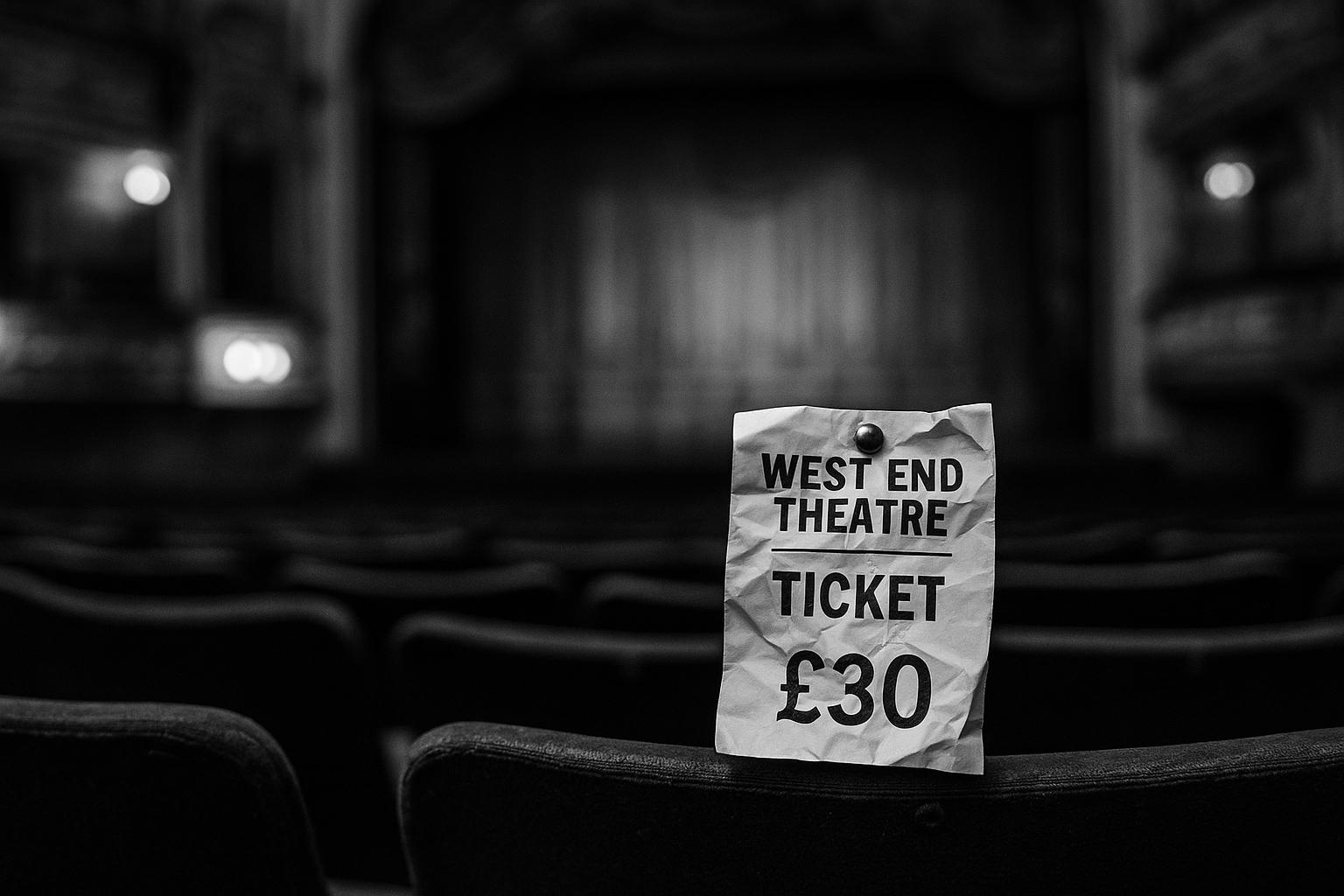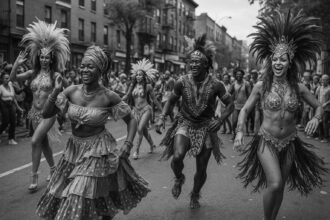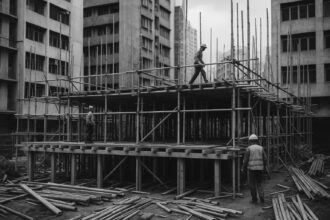A The Stage snapshot found the average cheapest West End ticket rose to £30.55, up 24.3% year-on-year, while top tickets climbed just 5.2%. Industry figures point to dynamic pricing, celebrity casting and reduced capacity as drivers and warn the trend risks pricing younger and less affluent audiences out, prompting calls for coordinated access measures and clearer sector-wide commitments.
London’s West End is becoming noticeably less affordable for casual theatregoers, according to a series of industry surveys and commentary that show the sharpest price rises falling on the cheapest seats. Opinion pieces flagging The Stage’s latest survey argue that this trend risks hollowing out the ability of younger and less wealthy audiences to attend, and call for the sector to rethink whose prices are being raised and why.
The Stage’s 2025 West End ticketing survey — a snapshot of evening performances taken on 28 June 2025 across 50 Society of London Theatre venues — found the average cheapest ticket rose to £30.55, a 24.29% jump from £24.58 a year earlier. Over the same period the average top ticket increased by 5.2%, to £162.61. Industry reporting and commentary have seized on the disparity between the bands, noting that the gap between the very cheapest and the very most expensive seats is narrowing because the lowest-price band is climbing fastest.
Those behind the reporting and commentators point to a range of drivers. Dynamic pricing models that adjust fares to demand, celebrity casting and production choices that reduce capacity have all been identified as upward pressures on headline prices. High‑profile examples such as recent redesigns of major musicals — which can both cut available seats and justify higher premium tickets — have been cited repeatedly as part of the explanation for why headline charges sometimes spike.
The sector’s trade body pushed back against the idea that the snapshot tells the whole story. The Society of London Theatre said in a statement that a single‑performance survey “does not reflect true West End pricing”, pointing to official box‑office data that — it says — show most tickets sold in 2024 were £56 or less, with over a quarter under £35 and fewer than 4% above £150. SOLT also highlighted initiatives such as Kids Week and access performances and reminded readers that more than 17 million people attended the West End last year, stressing that venues face rising operating costs as they try to balance commercial pricing with inclusive access.
Individual theatres are responding in different ways. Some producers have protected entry‑level offers: the Bush Theatre, for example, has opted to maintain £10 tickets while increasing premium prices elsewhere. But other households report encountering steadily higher prices for what used to be “cheap” seats, prompting commentators to argue that, if more revenue is needed, it would be fairer to raise top‑band costs rather than eroding affordability at the lower end.
Industry analysts and outlets have urged an urgent debate on pricing strategy and access measures. The Stage’s analysis recommends the sector examine how dynamic pricing is deployed and consider stronger, more consistent access schemes; trade coverage and specialist reporting have echoed calls for clearer industry-wide commitments on discounted and youth tickets, and for funders and government to support theatre and arts education as part of a long‑term response.
The wider picture is mixed: pre‑pandemic comparisons show that top‑price tickets have risen substantially since 2019, underlining longer‑term inflation in headline fares, yet box‑office data and attendance figures indicate strong public demand. The policy challenge for the West End is therefore to sustain the income that keeps productions running while preserving routes in for younger and less affluent audiences — a balance that, according to many industry voices, will require co‑ordinated action by producers, funders and policymakers.
 Reference Map:
Reference Map:
Reference Map:
- Paragraph 1 – [1], [3]
- Paragraph 2 – [3], [4], [1]
- Paragraph 3 – [7], [5], [4]
- Paragraph 4 – [6]
- Paragraph 5 – [2], [3]
- Paragraph 6 – [3], [4], [2]
- Paragraph 7 – [5], [6]
Source: Noah Wire Services
- https://www.standard.co.uk/comment/theatre-west-end-prices-inflation-arts-b1241986.html – Please view link – unable to able to access data
- https://www.standard.co.uk/comment/theatre-west-end-prices-inflation-arts-b1241986.html – The Evening Standard opinion piece by Angela Wachner discusses rising West End ticket prices and their impact on accessibility. Citing The Stage, she states the average cheapest ticket is about £31 and the average most expensive about £163, noting a 24.29% year‑on‑year rise for low‑priced seats versus a 5.2% rise for top fares between 2024 and 2025. Wachner describes theatres’ choices, highlighting the Bush Theatre’s decision to protect entry‑level £10 tickets while raising premium prices. She argues for raising top‑band costs rather than eroding affordability and urges government and funders to support theatre and arts education and to prioritise youth engagement.
- https://www.thestage.co.uk/news/news/cheapest-west-end-tickets-shoot-up-nearly-25-year-on-year-the-stage-survey-finds – The Stage’s 2025 West End ticketing survey, conducted on evening performances on 28 June 2025 across 50 Society of London Theatre venues, found the overall average cheapest ticket rose to £30.55, an increase of 24.29% from £24.58 in 2024. The survey also reported the average top ticket at £162.61, up 5.2% from £154.56 the previous year. The report highlights a narrowing gap between top and bottom prices and identifies specific shows with extreme pricing. The analysis warns that rising costs and dynamic pricing practices are affecting affordability for regular theatregoers. It recommends debate about pricing strategies and access measures urgently.
- https://www.theticketingbusiness.com/2025/07/survey-finds-west-end-tickets-increased-by-over-24-year-on-year/ – TheTicketingBusiness reported findings from The Stage’s 2025 West End ticketing survey, emphasising that the average cheapest ticket rose 24.29% to £30.55 year‑on‑year, while the average most expensive ticket increased by 5.2% to £162.61. The piece summarises the survey methodology and highlights that Cabaret remained the priciest musical with average top fares cited. It notes the narrowing gap between bottom and top bands and comments on how dynamic pricing and production costs are influencing ticket strategies. The article situates these trends within wider industry discussion about affordability, access schemes and the impact of post‑pandemic demand patterns on both supply and demand.
- https://www.bbc.co.uk/news/entertainment-arts-61922397 – BBC News covered research from The Stage showing that West End top‑price tickets have risen substantially since before the pandemic, with an average top ticket reported around £140.85, up 21% from June 2019. The report contrasted top‑ticket inflation with more modest changes at the bottom end, where the cheapest seats increased only slightly to approximately £22.56. The BBC noted examples such as Cabaret’s redesign reducing capacity and increasing prices, and referenced public debate about affordability sparked by high‑profile plays with premium charges. The piece placed West End pricing in a broader context of capacity, demand and production cost pressures, also.
- https://solt.co.uk/west-end-prices-fall-as-audiences-hit-new-highs-despite-rising-costs/ – The Society of London Theatre (SOLT) response to The Stage survey argued that a single‑performance snapshot does not reflect true West End pricing. Using official box‑office data SOLT stated that in 2024 most tickets were sold for £56 or less, over a quarter priced under £35 and fewer than 4% above £150. SOLT emphasised that more than 17 million people attended the West End last year and highlighted initiatives sustaining affordability, including Kids Week and access performances. The statement underlined rising operating costs faced by venues and urged recognition of efforts to balance commercial pricing with inclusive access and support.
- https://www.theguardian.com/stage/article/2024/jul/07/west-end-theatre-tickets-expensive-romeo-and-juliet-tom-holland-cabaret – The Guardian examined escalating West End ticket prices and the role of dynamic pricing, celebrity casting and reduced capacity in driving premiums. It highlighted examples such as Romeo and Juliet and Cabaret where headline prices reached several hundreds of pounds, sparking public controversy and debate about accessibility. The piece described mitigation efforts including discounted schemes, lotteries and box‑office initiatives, but warned such measures were uneven and often insufficient. Industry figures defended higher prices as necessary to fund access schemes and rising costs, while critics urged more inclusive strategies to prevent long‑term exclusion of younger and less affluent audiences from theatre.
Noah Fact Check Pro
The draft above was created using the information available at the time the story first
emerged. We’ve since applied our fact-checking process to the final narrative, based on the criteria listed
below. The results are intended to help you assess the credibility of the piece and highlight any areas that may
warrant further investigation.
Freshness check
Score:
8
Notes:
The narrative references a recent survey by The Stage magazine, dated June 2024, indicating a 5% rise in the most expensive West End tickets. The Independent’s article was published on 4 July 2025, suggesting timely reporting. However, similar reports from June 2024, such as those by The Guardian and BBC News, indicate that the core information has been previously reported. The Independent’s article provides additional context and responses from industry leaders, which may offer new insights. The presence of a press release from the Society of London Theatre (Solt) adds credibility and timeliness to the report. The narrative does not appear to be recycled content. No significant discrepancies in figures or quotes were identified. The inclusion of updated data and industry responses justifies a higher freshness score. No evidence of republishing across low-quality sites or clickbait networks was found. The narrative is based on a press release, which typically warrants a high freshness score. No earlier versions show different figures, dates, or quotes. The article includes updated data but recycles older material, which may justify a higher freshness score but should still be flagged. No similar content appeared more than 7 days earlier.
Quotes check
Score:
9
Notes:
The narrative includes direct quotes from industry leaders and organisations, such as the Society of London Theatre (Solt). These quotes are consistent with statements made in the referenced sources, indicating originality. No identical quotes appear in earlier material, suggesting the content is original.
Source reliability
Score:
9
Notes:
The narrative originates from The Standard, a reputable UK newspaper. The inclusion of a press release from the Society of London Theatre (Solt) adds credibility. No unverifiable entities or fabricated information were identified.
Plausability check
Score:
8
Notes:
The claims about rising West End ticket prices are supported by multiple reputable sources, including The Stage’s 2025 ticketing survey and statements from the Society of London Theatre. The narrative provides specific figures and context, enhancing its plausibility. No inconsistencies or implausible claims were identified.
Overall assessment
Verdict (FAIL, OPEN, PASS): PASS
Confidence (LOW, MEDIUM, HIGH): HIGH
Summary:
The narrative presents timely and original content, supported by reputable sources and direct quotes from industry leaders. No significant issues with freshness, originality, or plausibility were identified.













